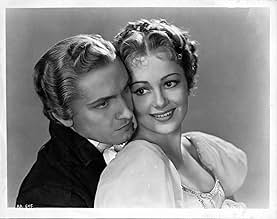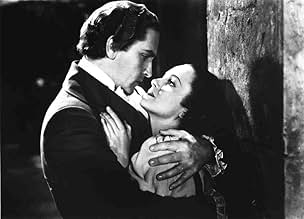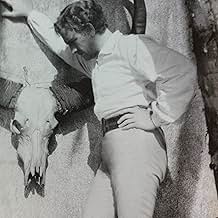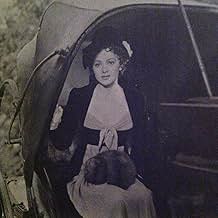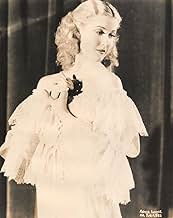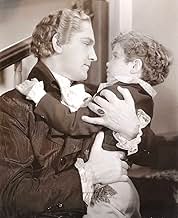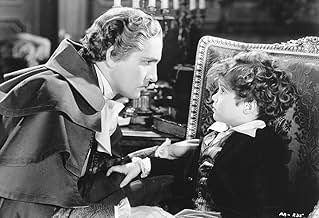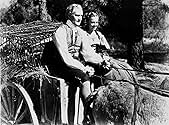Anthony Adverse
- 1936
- Tous publics
- 2h 21min
NOTE IMDb
6,3/10
2,1 k
MA NOTE
Ajouter une intrigue dans votre langueIn 18th-century Italy, an orphan's debt to the man who raised him threatens to separate him forever from the woman he loves.In 18th-century Italy, an orphan's debt to the man who raised him threatens to separate him forever from the woman he loves.In 18th-century Italy, an orphan's debt to the man who raised him threatens to separate him forever from the woman he loves.
- Réalisation
- Scénario
- Casting principal
- Récompensé par 4 Oscars
- 8 victoires et 3 nominations au total
Avis à la une
I rented a tape of Anthony Adverse mainly to see what kind of performance the Academy was looking for in the first-awarded "best supporting actress" category. Gale Sondergaard's time on camera was actually quite brief and her villainous role required a strictly one-dimensional reading. There were no subtleties whatsoever, nor was there any need in the film for them. Ordinarily, it might seem surprising that her part would receive any attention at all, not to mention a prestigious award, but keeping in mind that Oscars in those days were to a large extent self-congratulatory spectacles passed around from studio to studio year by year, it really isn't surprising.
The film was long and episodic, as was the novel, and not particularly good at that. There was the glitz we've come to expect of course with the duels and chases thrown in for good measure. I kept wondering if the novel was written with Hollywood in mind. It's hardly readable nowadays. As far as directorial touches are concerned, it's no wonder that Mervyn LeRoy has long disappeared from anyone's pantheon. The kiddie-car version of France must have excited the Depression audiences. The film is very long and very expensive so perhaps there's something to say about that.
The film was long and episodic, as was the novel, and not particularly good at that. There was the glitz we've come to expect of course with the duels and chases thrown in for good measure. I kept wondering if the novel was written with Hollywood in mind. It's hardly readable nowadays. As far as directorial touches are concerned, it's no wonder that Mervyn LeRoy has long disappeared from anyone's pantheon. The kiddie-car version of France must have excited the Depression audiences. The film is very long and very expensive so perhaps there's something to say about that.
Frederic March is "Anthony Adverse" in this 1936 film that also stars Olivia de Havilland, Claude Rains, Anita Louise Gail Sondergaard, Donald Woods, Edmund Gwenn and Louis Hayward.
Anita Louise and Hayward both have small roles as illicit lovers in the beginning of the film - she's married to Marquis de Luis (Claude Rains) and dies giving birth to a son by Denis (Hayward). The evil marquis drops the baby off at a convent, where he lives until he is 10 years old. Then he is adopted by a merchant, Mr. Bonnyfeather (Gwenn), who happens to be his grandfather.
Bonnyfeather sees his daughter in the boy's (Billy Mauch) angelic face. This beautiful little boy grows up to be a blond Frederic March, who has been given the name Anthony Adverse. He's in love with Angela (de Havilland), an aspiring opera singer, but goes to Africa to recover his grandfather's fortune rather than stay with her. There he becomes involved in slave trading. When he returns, things have changed for Angela - and for him.
The film is based on a best-selling book, and I have to agree that both the film and the book seem forgotten today, as is the director, Mervyn Leroy. March is wrong for the role - he doesn't convey enough charisma, for one thing - certainly Brian Aherne or Errol Flynn would have been much more compelling. March was a wonderful actor but he needed a strong director to get him away from being "stagy," and this type of role was never his métier anyway.
The gorgeous ingénue de Havilland gives a lovely performance, but the standouts are the villains - Sondergaard, as Bonnyfeather's housekeeper and Claude Rains as the marquis.
TCM gives this movie very high stars, probably based on the fact that it won four Oscars (one for Sondergaard who doesn't do much but look snide) and that it was nominated for Best Picture in 1936. The pickings must have been slim.
This is a good film, with an exciting carriage chase in the mountains and some brutal scenes of slave trading, but it's hard to keep interested in it. Adverse isn't terribly likable, for one thing. It's the story of a man and how he is molded into a human being by two priests and a woman. It's a lofty idea that doesn't quite make it onto the screen.
Anita Louise and Hayward both have small roles as illicit lovers in the beginning of the film - she's married to Marquis de Luis (Claude Rains) and dies giving birth to a son by Denis (Hayward). The evil marquis drops the baby off at a convent, where he lives until he is 10 years old. Then he is adopted by a merchant, Mr. Bonnyfeather (Gwenn), who happens to be his grandfather.
Bonnyfeather sees his daughter in the boy's (Billy Mauch) angelic face. This beautiful little boy grows up to be a blond Frederic March, who has been given the name Anthony Adverse. He's in love with Angela (de Havilland), an aspiring opera singer, but goes to Africa to recover his grandfather's fortune rather than stay with her. There he becomes involved in slave trading. When he returns, things have changed for Angela - and for him.
The film is based on a best-selling book, and I have to agree that both the film and the book seem forgotten today, as is the director, Mervyn Leroy. March is wrong for the role - he doesn't convey enough charisma, for one thing - certainly Brian Aherne or Errol Flynn would have been much more compelling. March was a wonderful actor but he needed a strong director to get him away from being "stagy," and this type of role was never his métier anyway.
The gorgeous ingénue de Havilland gives a lovely performance, but the standouts are the villains - Sondergaard, as Bonnyfeather's housekeeper and Claude Rains as the marquis.
TCM gives this movie very high stars, probably based on the fact that it won four Oscars (one for Sondergaard who doesn't do much but look snide) and that it was nominated for Best Picture in 1936. The pickings must have been slim.
This is a good film, with an exciting carriage chase in the mountains and some brutal scenes of slave trading, but it's hard to keep interested in it. Adverse isn't terribly likable, for one thing. It's the story of a man and how he is molded into a human being by two priests and a woman. It's a lofty idea that doesn't quite make it onto the screen.
Fredric March stars as the title character, an orphan boy discarded due to his illegitimacy, who overcomes much adversity throughout his life. He is raised in a convent and adopted by a wealthy merchant, Edmund Gwenn, at the age of ten. He learns the business, but is shipped to Havana around the time of the French Revolution. Before he departs, it is learned that he has married the daughter of a servant, Olivia DeHavilland. He is thought lost at sea by all, but is actually in Africa running a slave trade, with his heart blackening the whole time. From there, the tale takes many twists as Anthony must find goodness in his heart again, and DeHavilland may be the key. The drama is a bit heavy-handed and some overacting is present. Claude Rains and Gale Sondergaard make great antagonists, and Sondergaard won a Best Supporting Actress Oscar for her performance.
Fredric March, usually such a fine actor, was unable to give more than a wooden performance in the title role of 'Anthony Adverse'. Warner Bros. would have been better off using their up-and-coming new star, Errol Flynn, for this one--giving us the chance to see him paired once again with Olivia de Havilland. There are no sparks between March and de Havilland--he seems too old for the role despite clever make-up attempts to make him look suitable. But aside from the fact that he is miscast, there is a lot to admire about the film itself. For one thing, Claude Rains and Gale Sondergaard make the most memorable pair of villains ever seen in a 1930s movie. The sequence where they cause a coach and driver to go off a cliff is given an extra punch by their dialog. "He was my favorite coachman," says Rains dryly. "The coach was rather handy too," quips Sondergaard. Giving other outstanding performances are Edmund Gwenn, Louis Hayward, Anita Louise, Donald Woods and Akim Tamiroff. Some of the acting styles seem dated, as are the titles that connect the time span. The best-seller was a bulky 1,200 pages from which the scriptwriter trimmed the story down considerably, excluding whole segments of the book and still ending up with a film well over two hours. Strange how the celebrated novel is barely remembered today. The opera scenes with Olivia de Havilland are interesting. She was a radiant young beauty at the time but could have used a better technique in her lip sync to the lyrics. Interesting historical drama of the Napoleonic era with Rains and Sondergaard giving the best performances. I've written articles on both of them for CLASSIC IMAGES, inspired by their performances in this film.
Hervey Allen (1889-1949) spun quite an elaborate, sweeping 18th-19th century yarn in the form of a gigantic novel, published in 1933, called "Anthony Adverse." It became a best-seller, and three years later Warner Bros. brought it to the screen, directed by Mervyn LeRoy.
The film was very long, comprehensive, and romanitc, in Allen's quasi-Dumas-Dickens-Tolstoy style.
Heading the cast were four of the screen's finest actors, leading players Fredric March and Olivia de Havilland; and supporting character players Claude Rains and Gale Sondergaard.
Providing the musical score was the legendary Eric Wolfgang Korngold (with orchestrations by Hugo Friedhofer) and classic masque and operatic excerpts by Monteverdi and Francetti.
The 141-minute film today seems much longer than it is, as we follow Anthony's detailed "adventures" in Europe, Cuba, and Africa, with America targeted as a final future destination. The whole production, which was considered of blockbuster size in 1933 (and still looks impressive), emerges more like a historic relic that is occasionally pulled from a treasure cabinet, to observe and ponder.
The whole feel of the film now seems dated and out-of-fashion, but then that's what most memorabilia is. It's merely dusted it off, polished, felt for the moment, then replaced along side other treasured pieces from the past.
The film was very long, comprehensive, and romanitc, in Allen's quasi-Dumas-Dickens-Tolstoy style.
Heading the cast were four of the screen's finest actors, leading players Fredric March and Olivia de Havilland; and supporting character players Claude Rains and Gale Sondergaard.
Providing the musical score was the legendary Eric Wolfgang Korngold (with orchestrations by Hugo Friedhofer) and classic masque and operatic excerpts by Monteverdi and Francetti.
The 141-minute film today seems much longer than it is, as we follow Anthony's detailed "adventures" in Europe, Cuba, and Africa, with America targeted as a final future destination. The whole production, which was considered of blockbuster size in 1933 (and still looks impressive), emerges more like a historic relic that is occasionally pulled from a treasure cabinet, to observe and ponder.
The whole feel of the film now seems dated and out-of-fashion, but then that's what most memorabilia is. It's merely dusted it off, polished, felt for the moment, then replaced along side other treasured pieces from the past.
Le saviez-vous
- AnecdotesGale Sondergaard made her film debut in "Anthony Adverse" and won an Academy Award in the brand-new category of Best Supporting Actress.
- GaffesDuring the duel between Don Luis and Denis Moore, the sword wielded by Moore was "unbated", i.e. his fencing foil was blunted with a protective guard on the tip.
- Citations
[first title card]
Title Card: Those who are destined to live during times of war and social upheaval are victims of cruel fate ~~ unable to find comfort in the past or peace in the present. They are the spiritual orphans of the world.
- ConnexionsFeatured in The Making of a Great Motion Picture (1936)
- Bandes originalesI'll Wait For You My Love (Angela's Song)
(uncredited)
Composer: Erich Wolfgang Korngold
Lyrics by Howard Koch (uncredited)
Sung by Carol Ellis (uncredited)
Meilleurs choix
Connectez-vous pour évaluer et suivre la liste de favoris afin de recevoir des recommandations personnalisées
- How long is Anthony Adverse?Alimenté par Alexa
Détails
- Date de sortie
- Pays d’origine
- Langues
- Aussi connu sous le nom de
- Anthony Adverse, marchand d'esclaves
- Lieux de tournage
- Société de production
- Voir plus de crédits d'entreprise sur IMDbPro
Box-office
- Budget
- 1 050 500 $US (estimé)
- Durée2 heures 21 minutes
- Couleur
- Mixage
- Rapport de forme
- 1.37 : 1
Contribuer à cette page
Suggérer une modification ou ajouter du contenu manquant



